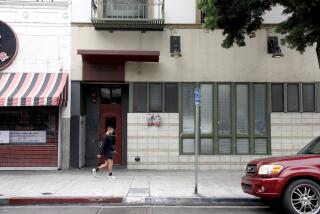KOCE Sale Ruled Invalid
- Share via
A state appeals court for the second time ruled Friday that an Orange County community college district should not have sold its public television station to a foundation instead of televangelists who offered more money.
The 4th District Court of Appeal said the Coast Community College District can either keep KOCE-TV or put it up for sale again. The district already has transferred the station and broadcast license to the nonprofit KOCE-TV Foundation, and neither is sure what will happen next.
The district “is in a world of trouble,” said Richard Sherman, attorney for the Dallas-based Daystar Television Network, which sued to overturn the sale. “It’s just a shame for the school district and the students that their board members have gotten them into so much trouble.”
The sale of KOCE to the foundation, made up of wealthy business and civic leaders and which once was the station’s fund-raising arm, was completed in 2004.
An Orange County Superior Court judge allowed the sale to proceed, but the appeals court overturned it last June in a biting decision that called the deal “the rankest form of favoritism.” When the court agreed to rehear the case last summer, the foundation and the district were optimistic. But the three-judge panel unanimously reaffirmed its earlier decision.
Milford Dahl, an attorney for the college district, said the board of trustees, which isn’t scheduled to meet until June 21, must decide what to do next.
The district could appeal to the state Supreme Court or ask the appeals court to hear the case a third time, Dahl said, but “both are longshots.”
If the district doesn’t appeal, the case will be sent back to Superior Court, where Dahl expects a judge to order KOCE returned to the district in what promises to be a long and complicated process.
“It’s going to be extremely costly to the taxpayers,” Dahl said. “Daystar doesn’t win anything. They think they did, but the taxpayers are the ones that really got had by that decision.”
Since the sale, the station moved from Golden West College in Huntington Beach to Santa Ana. Some employees transferred from the district to the foundation, others took buyouts and some took jobs at the college district.
Just transferring the Federal Communications Commission license would take months, Dahl said.
The district decided to sell KOCE in 2002 so it wouldn’t have to continue subsidizing the station by about $1.8 million annually.
Daystar offered $25.1 million in cash. It raised its offer to $40 million one day after the sale deadline, but the district would not consider the new bid.
Foundation officials made an offer they said was worth $32 million, with an $8-million down payment and the rest to be paid over time with interest. But when the sale was completed, the payments were to be made over 30 years at no interest, with no payments for five years. In addition, the district cut an additional $4 million off the price.
The appeals court decision said these changes lowered the sale price to between $19.5 million and $23.5 million, substantially changing the deal, giving the foundation “an unfair advantage.”
Taking back the station would create financial problems for the community college district, which has already spent the $8-million down payment. If the foundation is forced to give back the station, it would need to repay a $10-million bank loan it struggled to land.
The predicament again raises the question of why the foundation, which counts some of the county’s wealthiest people as supporters, such as drug company executive David Pyott, former baseball commissioner Peter Ueberroth and high-tech executive Henry Samueli, struggled to raise the money for the station. The deadline for the sale was extended several times so the foundation could raise the cash.
Public Broadcast System affiliates rarely come up for sale. When they do, religious broadcasters are eager buyers, because they can operate under the station’s noncommercial license while still soliciting donations.
KOCE is especially attractive because it is a full-power station in one of the country’s largest markets. FCC rules require that it be carried on cable systems throughout Southern California. Elliot Evers of Media Venture Partners in San Francisco, who brokered the KOCE deal, has said he told district officials from the beginning that religious broadcasters would make the best offer.
Despite Friday’s court decision, KOCE viewers shouldn’t expect any changes in the next few months, said Mel Rogers, president of the foundation and the TV station.
“These things take years to resolve, and we’re going to keep plugging away,” he said. “It’s really important that Orange County has one television station that pays attention to it.”
“We’re going to keep pursuing this in courts and elsewhere if necessary,” he said.
Rogers suggested that the district could retain ownership of the station while the foundation ran it.
In the meantime, the district is fighting a second lawsuit brought by Daystar, alleging that the district and board trustees violated freedom of religion provisions of the Constitution by not selling KOCE to the Christian broadcaster. The lawsuit seeks between $20 million and $30 million in damages.
Sherman said Friday that Daystar would be more willing to settle the second suit if the district puts the station up for sale again.
Board trustee Jerry Patterson said he resented what he considered Daystar’s intimidation.
They’re just trying to scare us, he said.
More to Read
Sign up for Essential California
The most important California stories and recommendations in your inbox every morning.
You may occasionally receive promotional content from the Los Angeles Times.













